Best ERP Software for Your Business
Best ERP software are Oracle NetSuite, Microsoft Dynamics, SAP ERP, TallyPrime, and DataNote. It simplifies your entire business and keeps all data in one place. As a result, it allows for a more efficient, accurate, and data-driven work environment.



Connect With Your Personal Advisor
List of 20 Best ERP Software
Until 31st Mar 2023

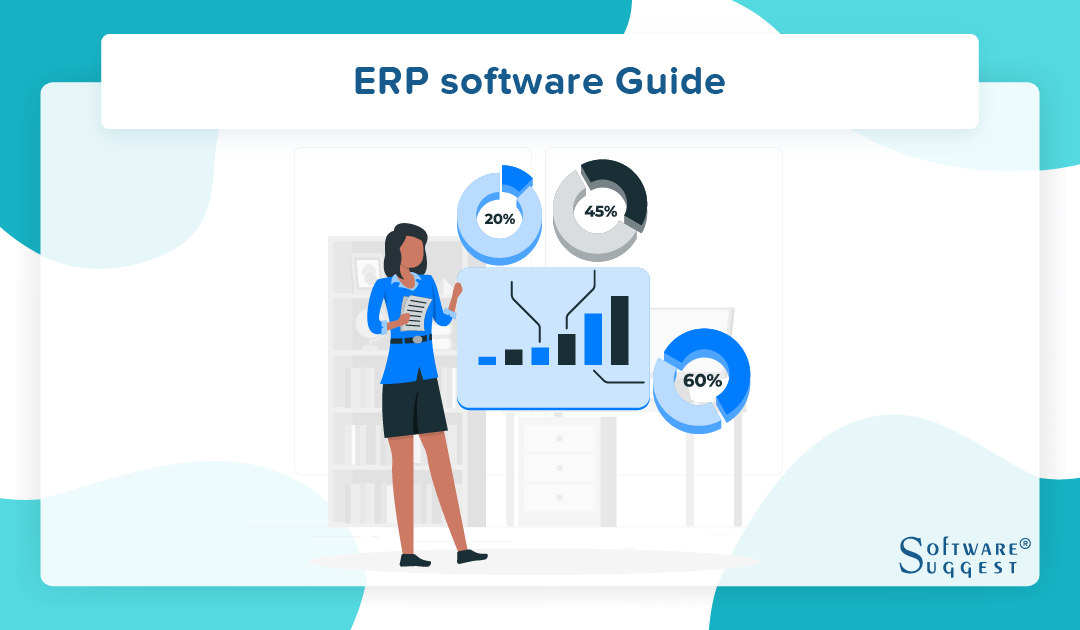
ERP Software: A Definitive Guide
Enterprise Resource Planning, more popularly known as ERP software is an integrated suite of various business processes. It manages an organization’s back-office tasks as well as streamlines different business aspects, including inventory, accounting, human resources, customer relationship management, and beyond. To keep it precise, one can say that ERP software integrates various functions across the organization into one complete system.
Must-Have Enterprise Resource Planning Software Features
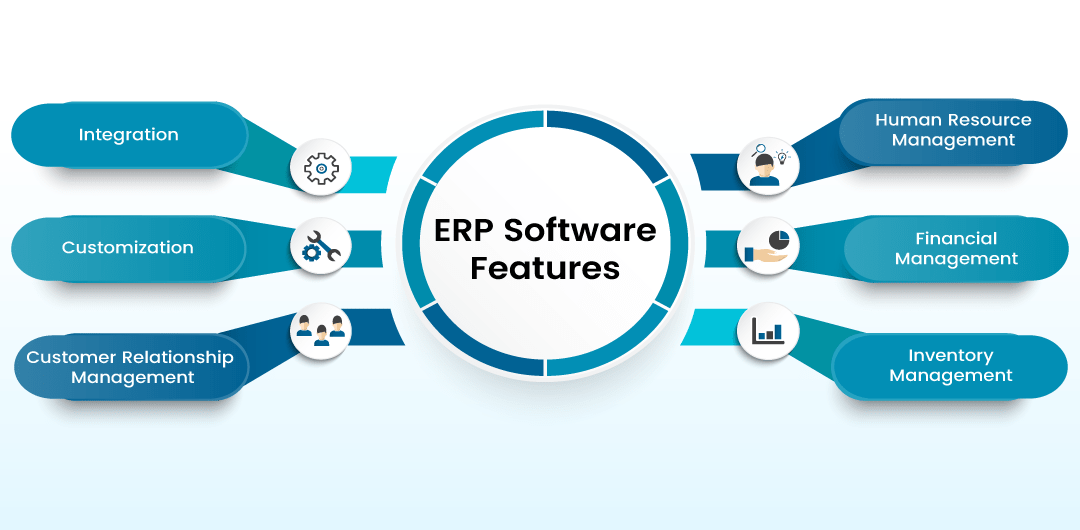
At the end of the day, Enterprise Resource Planning Systems are after all an investment. Although different businesses have different requirements, there are some basic features that any top ERP software solutions must have so that your investment is worthwhile. Here are the six must-have features for any Best Enterprise Resource Planning software:
1. Ease of Integration:
When you decide to switch to a top ERP system software, you will be migrating a lot of data between different systems and may also be using third-party software. There is a good chance that erp integration issues might arise. Hence, before you purchase a Cloud ERP system, make sure it is compatible with your existing systems for proper deployment.
2. Customization:
It must be easily customizable to suit the needs of the company. Your web-based ERP system might have several advanced features, but if they are of no use to your business operations, it doesn’t make sense. It must be flexible enough to customize its functionality to fit the operational requirements of your business model.
3. Customer Relationship Management (CRM):
A CRM module is a must for any business for the proper management of leads, customer service tracking, and marketing automation. It’s important that the enterprise resource software you choose must have an integrated CRM module, else it leads to double data entry and having to look up details in both systems.
Top ERP system solutions with an integrated CRM software module helps a great deal in sending running marketing campaigns or sending emails that generate business. It helps in addressing customer needs in a better manner, and identification of their buying patterns and preferences. It also eliminates the need for bearing the cost of two different systems.
4. HRM (Human Resource Management):
An HRM system deals with the most important resource of the business – its employees. Over time, HRM modules have evolved to expand their capabilities beyond basic reporting, payroll, and employee management and include features for attendance management, performance tracking, scheduling, etc.
Hence, it is important that the top ERP system must have these functionalities. With a cloud ERP system software that has an HRM module, it becomes easier to analyze HR processes and generate reports.
5. Financial Management:
Financial filings undergo a great deal of scrutiny with the ever-changing regulatory requirements. An ERP system with a financial CRM management suite makes it easier for companies to comply with the standards of financial reporting and requirements of tax, all within a single system that takes care of accounting, banking as well as payments.
Without these features, there is a good chance that companies will miss payments or overlook important details in the accounting books. Best ERP accounting software with financial management modules can not only lower costs but also help improve cash flows and increase profits. It gives way to transparent, accurate, and timely reporting.
6. Ease of Use:
No matter how much functionality the ERP enterprise software brings in, it is very important that the features are easy to use and come with an easily navigable dashboard. If the system is complicated, employees might fail to use it which beats the entire purpose to make their jobs easier and more efficient. It should be easy to track changes and manage data.
Benefits of Using Enterprise Resource Planning Software
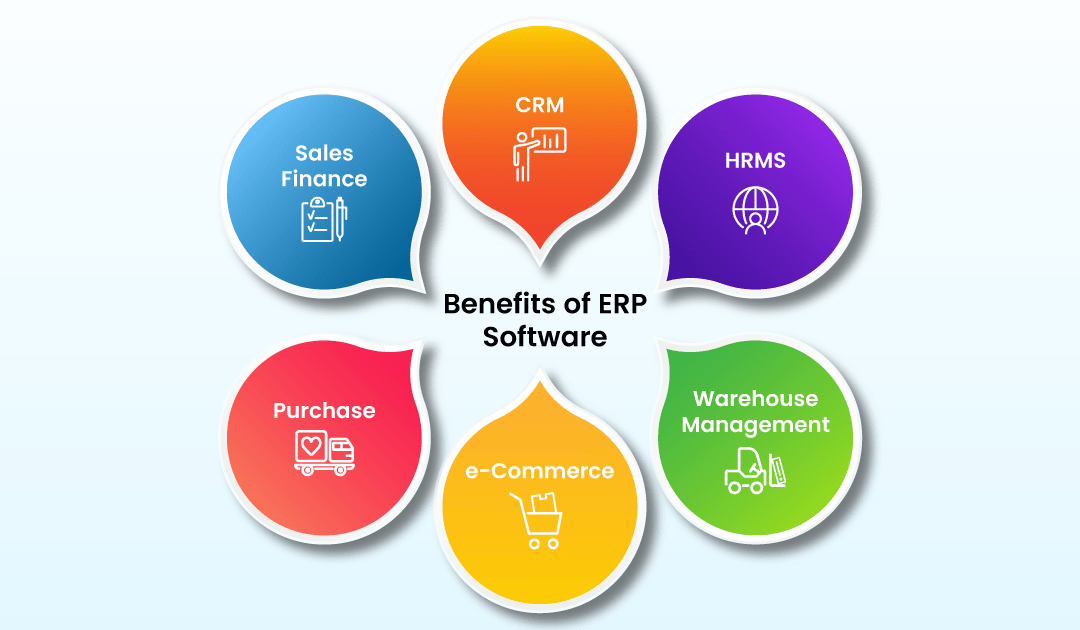
The best enterprise resource planning system adds a lot of value to the business. At its core, Top ERP solutions essentially solve the problem of ‘silos’ in an Enterprise. Some of its benefits are:
1. Increases the efficiency with which employees do their jobs.
2. Eliminates barriers between different business units by facilitating departmental collaboration.
3. It drives improvements by allowing for global and real-time viewing of data so that issues can be proactively addressed.
4. It improves quality control and reduces risk by improving compliance with financial and regulatory standards.
5. It brings automation in business processes.
6. It improves customer service.
7. Lower business costs by eliminating processes and systems that are redundant.
8. It improves design making by helping businesses in managing and connect information that is generated from different core areas of the organization.
Factors to Weigh During Your ERP Software Comparison
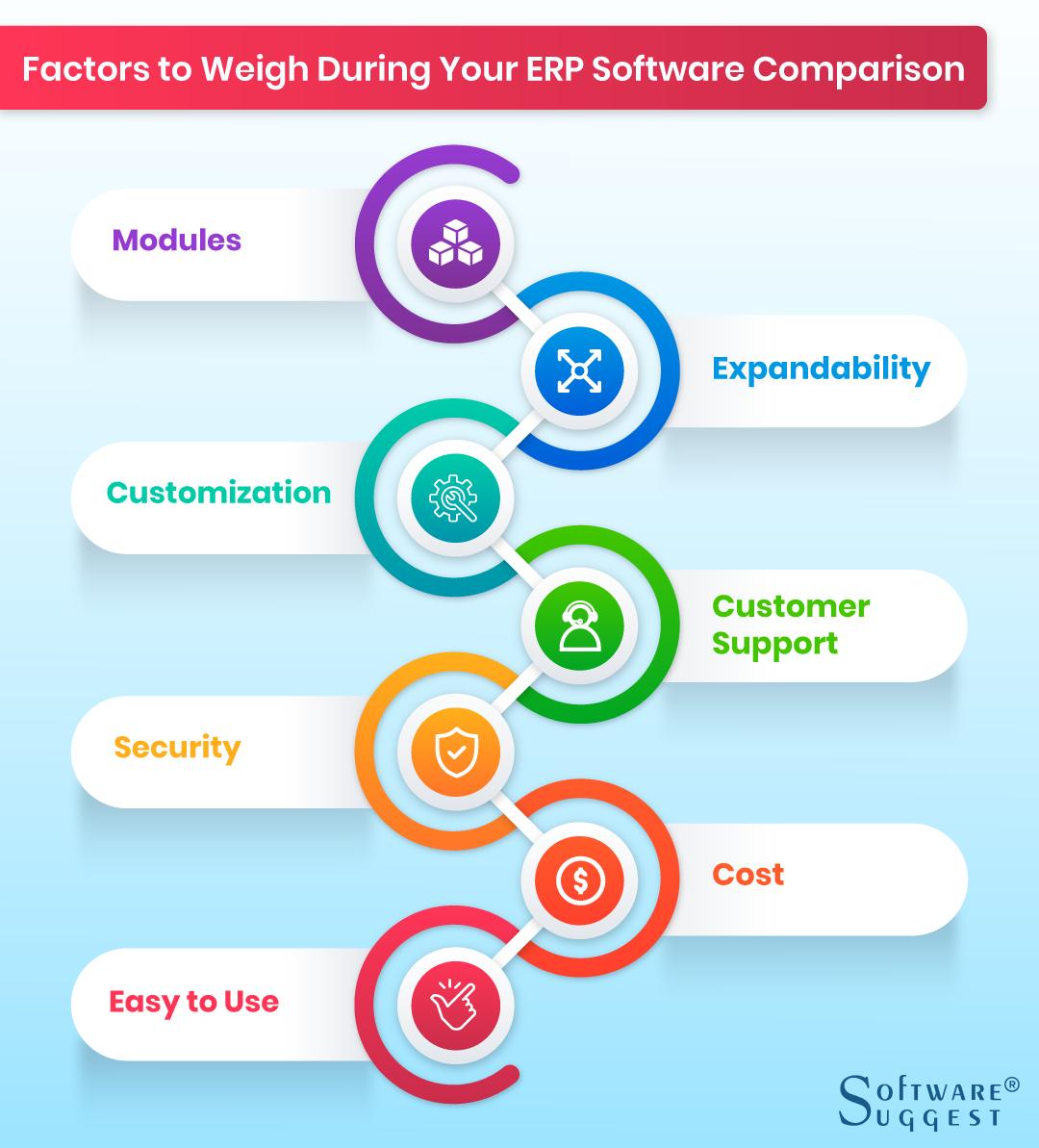
ERP system Software is a complex system that provides solutions across a variety of departments. As almost all the software offers similar functionality, it can be challenging to compare the enterprise resource planning system. However, you can consider the following things to differentiate between various ERP system software providers:
1. Modules:
Consider the features and functionality of different ERP systems and choose the one that fits into your organizational structure.
2. Expandability:
Choose the software that can accommodate the growing needs of organizations such as new employees, new business lines, etc.
3. Customization:
Compare enterprise resource planning system based on customizability that can be done to fit the unique needs of the organization.
4. Customer Support:
Choose an ERP system vendor that offers maximum customer support from implementation to maintenance.
5. Security:
The Enterprise resource planning system you choose should offer high-end security. Ask various vendors about security encryptions that you need in the software.
6. Cost:
The software should save cost in terms of process automation and increased efficiency, and at the same time, it should be affordable.
7. Easy To Use:
Choose a system that is less complicated and more convenient to use
ERP Software Used by Industries
When it comes to segmenting the use of ERP software industry-wise, it’s noteworthy to mention that 33.66% of the total ERP use is by manufacturing firms to streamline their operations. IT contributes 14.85%, Professional or Financial Services contribute 13.86%, whereas Education, Mining, Healthcare, Distribution and Wholesale, Retail, etc. make up the rest contribution to ERP use.
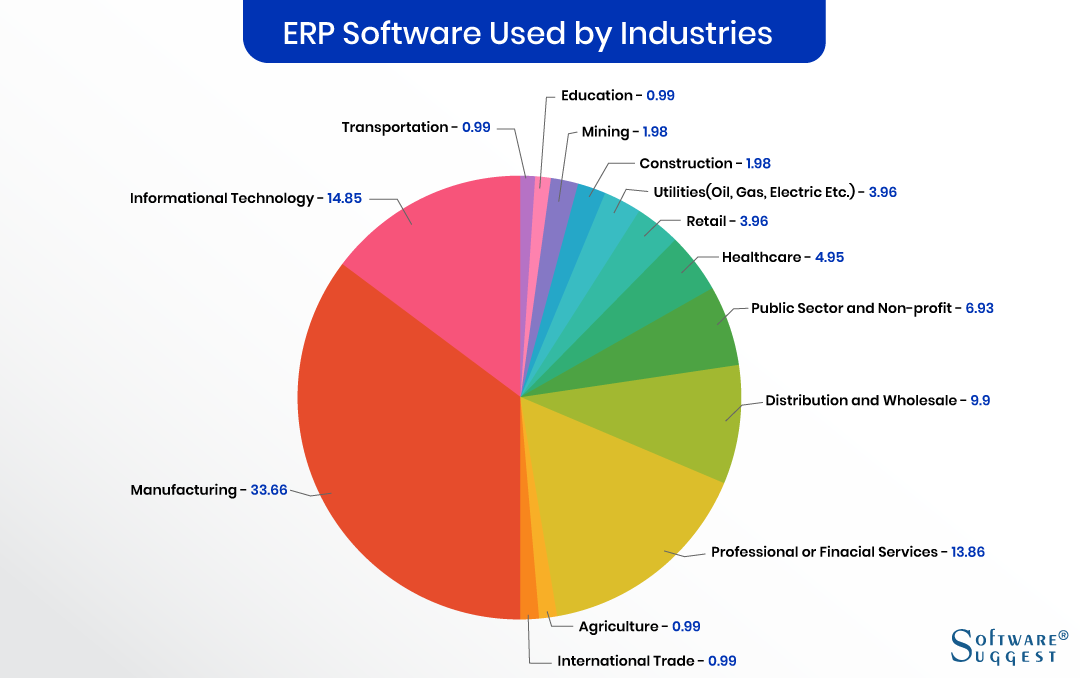
How will AI Transform the Future of ERP Systems?
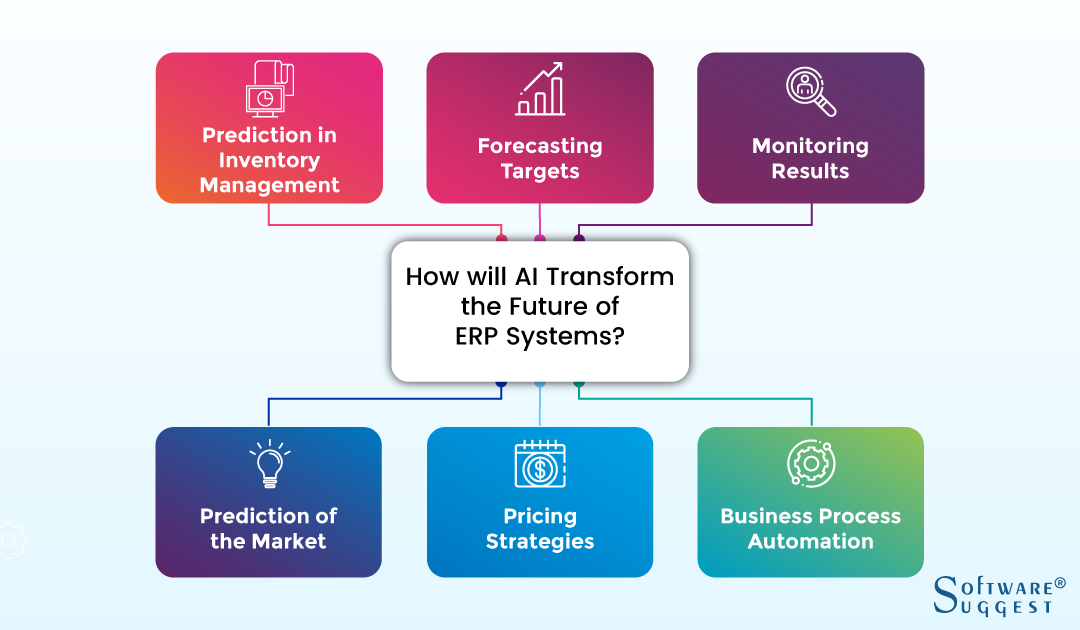
Artificial intelligence, along with machine learning and natural-language interfaces, will play a significant role in providing data-driven insights through ERP systems. From digital assistance to successful supply chain management and from offering productive recommendations to forecasting, AI and ERP systems have a long journey. Few areas where AI-enabled enterprise resource planning system will play major roles in:
1. Advanced prediction in inventory management
2. Forecasting targets
3. Monitoring results
4. Prediction of the market
5. Pricing strategies
6. Business process automation
Top ERP Software Trends
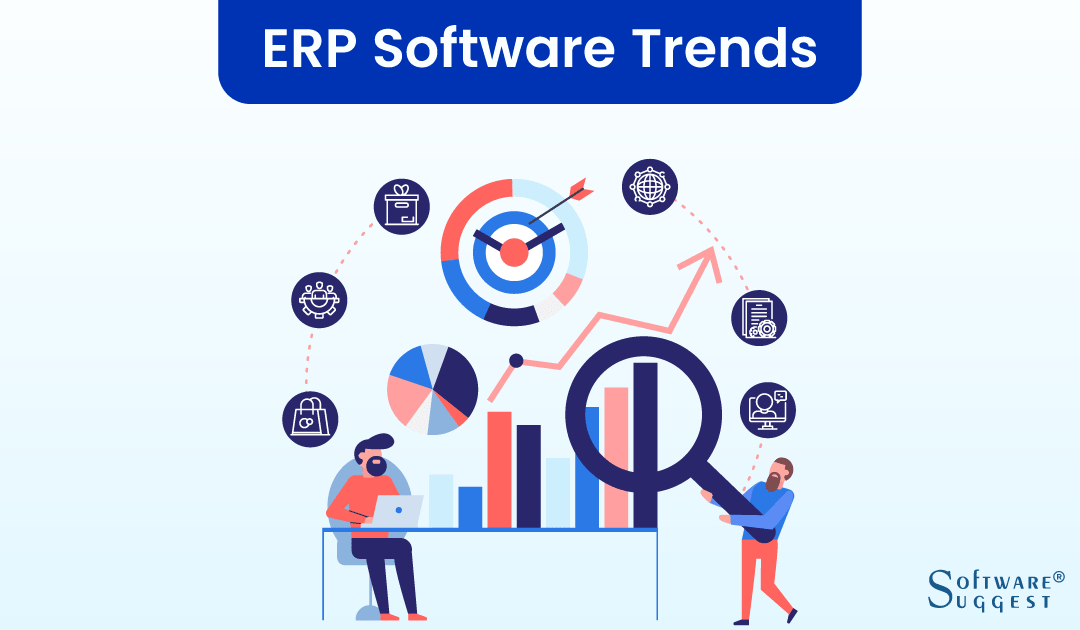
Web-based enterprise resource planning system is certainly the latest buzzword in the corporate world, and companies all over the world have adopted various kinds of top ERP systems that can help their organization accrue various advantages. There are diverse options available in the market space, and any small-medium size business can streamline operational efficiency and task flow management by investing in top ERP systems.
There are numerous emerging movements in the current ERP system – it is a good idea to research the available options and take an enterprise resource planning system demo from a credible vendor before making a final decision. Here are some major trends to watch out for before you get a cloud ERP solution for your company:
1. Mobile ERP Platforms:
One of the biggest changes in web-based enterprise resource planning systems is that it is adapting to mobile devices to boost productivity and usability. This allows salespersons, professionals, and team members to access information on the move, no matter where they are – all that is required is a high-speed internet connection.
Most leading best ERP solution vendors are adding add-on modules to increase mobility as it greatly pushes up the utility and benefits of top ERP systems in the present technological scenario.
2. Cloud-based ERP Solutions:
The prominence of SaaS and cloud-based ERP software packages is increasing, and most companies are going to great lengths to invest in them. Cloud-based enterprise resource planning systems have a number of additional benefits such as a voluminous database, automated updates, heightened security features, and universal geographical accessibility.
The adoption of IoT (Internet of Things) along with cloud technology has opened up a world of possibilities for organizations and made workflow more flexible and agile.
3. The Rise of Artificial Intelligence:
Web-based ERP software is now increasingly automated and there is a massive rise in the inclusion of artificial intelligence software. This helps in better business forecasts, and predictions, and helps senior executives to take smarter corporate decisions.
Most generic modules of an enterprise resource planning system now are powered by business intelligence features that reduce the manual workload, and administrative paperwork, and are highly cost-effective. Artificial intelligence ERP system software is a complete necessity in the current fast-paced times and can help any company pump up existing profit levels.
4. Better Integration Architecture:
One upcoming trend in the top ERP systems software market is the rise of highly scalable, customizable, and integrated software packages. Top ERP systems are not always standalone platforms, rather they often need to function along with a host of other vital business applications.
Better and more sophisticated integration architecture facilitates the seamless functioning of different organizational applications such as accounts, human resources, or billing systems – placing top ERP systems as a holistic and competitive business weapon for any kind of firm.
There are many changing trends in the ERP system software market and it is a dynamic revolutionary field. It is important to keep up-to-date and know about emerging patterns in the industry by taking regular ERP software demos, so as to invest in the best ERP solutions for your organization.
Important Enterprise Resource Planning System Modules
Here are some common and useful enterprise resource planning system solutions modules that are embedded in the most recent ERP application software systems:
1. Financial management
2. Customer Relationship Management (CRM)
3. Sales & Marketing
4. Human Resource Management (HRM)
5. Manufacturing
6. Supply Chain Management (SCM)
7. Inventory
8. Purchasing
Financial management
-
Automation and Management of End-to-End General Accounting Procedures
-
Support for Worldwide Financial Processes
-
Planning and Forecasting
-
Cash Flow Management and Tracking
CRM
-
Contact management
-
Reporting and dashboards
-
Lead management
-
Deals and Tasks & More
Sales & Marketing
-
Email Marketing & Marketing Automation Tools
-
Measure your success
-
Mailing List for every purpose
-
Reporting
Human Resource Management
-
Performance evaluation
-
Employee scheduling
-
Time tracking & Attendance management
-
Payroll management & More
Manufacturing
-
Customer Relationship Management
-
Manufacturing Execution System
-
Quality Management System
-
Supply Chain Management
Supply Chain Management
-
Inventory management
-
Order management
-
Logistics and shipping status
-
Return management
Inventory Management
-
Inventory Counts
-
Lot Tracking
-
Backorder Management
-
Multiple Warehouses & Inventory Locations
Purchasing Management
-
Approval Routing
-
User Role Controls
-
Expense Tracking
-
Cost Allocation
Important Things to Consider While Buying ERP Tools for Your Business
ERP accounting software serves as an indispensable solution that can bring about efficiency and enhance final output levels in an industrial company. However, investing in the right ERP business software is certainly not an easy task – there are many important challenges and aspects to look into before making a final decision.
Here are some key considerations that decision-makers must investigate and keep in mind before getting top-class ERP tools that will surely boost up productivity and engagement levels:
1. User-Friendly:
Complicated or difficult ERP software is a definite recipe for business disaster and your employee base will reject any such complex system instantly. ERP accounting software needs to be extremely user-friendly and simple for maximum people in your organization to accept the new system.
Your ERP tools should not require any kind of expertise or technical training - a simple demonstration should be enough for your workers to understand the features and adopt the new ERP business software.
2. Client References:
Positive software references are a big confidence enhancer and help to buy in executive support for getting ERP tools for your company. It is essential to check the reviews of satisfied clients before investing in ERP accounting software systems.
Reviews and references often bring to light valid loopholes and problem areas in cloud ERP tools that can be rectified or avoided by your organization. Look out for credible and genuine references from companies that are similar to your own to make sure that you do not get any unexpected surprises from your ERP business software.
3. Security:
Data safety and protection is a vital consideration that has to be kept in mind before deciding to go in for ERP accounting software. Best ERP tools handle huge amounts of sensitive and conferential information that needs authorized user access or control – it is very important to choose ERP tools that do not compromise on data security.
Most modern ERP business software contains sophisticated security features such as password protection, encryption, and firewalls to protect data from fraudulent users, theft, or misappropriation. It is wise to check the safety features in detail before deciding on an excellent ERP accounting software platform for your startup or small business.
4. Vendor Support:
Investing in ERP software is surely not a short-term decision and should be able to yield a good return on investment for your organization in the long run. It is necessary to choose a reliable software vendor who provides long-term support and maintenance even after the initial installation period.
ERP accounting software needs regular maintenance checks and updates so as to avoid any technical glitches – make sure your contract includes these terms and conditions for superior vendor support and service.
Implementing ERP tools takes a considerable amount of time, energy, and resources – make sure that your managers check these key critical aspects before choosing ERP business software. It is sure to have a far-reaching positive.
Related Articles:.
- VAT in Gulf: How Cloud ERP Software Can be a GameChanger
-
How To Use ERP Software for Getting the Most Out Of Your Investment?
-
Tips & Tricks for Selecting the Right ERP System for Your Business
-
ERP vs. Accounting Software – What are The Major Differences?
-
eCommerce ERP Integration – Benefits, Challenges and Best Practices
-
ERP for Logistics and Distribution Companies : A Definitive Guide
-
ERP in Production Planning: The Future of Manufacturing Industry
-
ePROMIS vs. Oracle Fusion vs. Oracle Netsuite vs. SAP S4HANA vs. Microsoft Dynamics 365



.png)